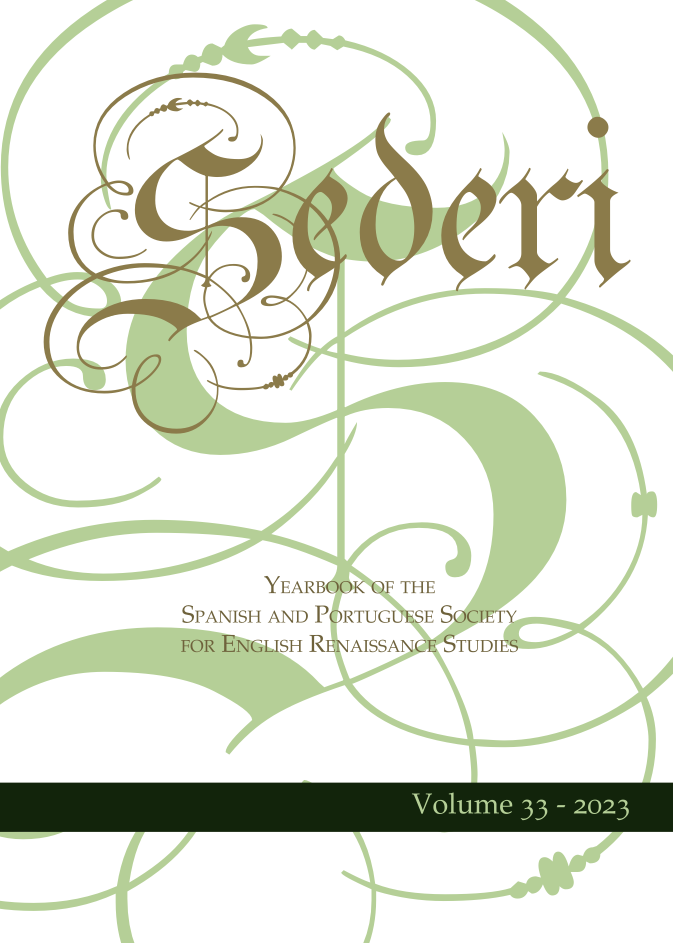
Sederi 33
Sederi 33 — 2023
EDITOR
Marta Cerezo Moreno
MANAGING EDITOR
Isabel Guerrero Llorente
REVIEW EDITOR
Miguel Ramalhete
PRODUCTION EDITORS
David J. Amelang
Tamara Pérez-Fernández
ISSN 1135-7789
Marguerite Tassi, “Pursuing contentment and liberation in the Forest of Arden: Hindu and Buddhist resonances in As You Like It.” SEDERI 33 (2023): 57–80.
DOI: https://doi.org/10.34136/sederi.2023.3 Download PDF
Abstract
This essay approaches Shakespeare’s As You Like It through the ancient wisdom traditions of Hinduism and Buddhism. Focusing on a number of influential classic Indian texts, this study considers how distinctive features of Eastern spirituality resonate with Shakespeare’s depiction of the Forest of Arden as a refuge where contentment can be fostered and liberation pursued as life’s ultimate goal. Shakespeare’s pastoral comedy dramatizes how virtues that lead to liberation are facilitated within the eco-religious space of Arden where the threefold Hindu concept of world forest is embodied. Such an ecumenical approach invites readers to contemplate what wisdom traditions beyond the Abrahamic religions can contribute to Shakespeare’s religious afterlives.
Keywords: As You Like It, Buddhism, contentment, Hinduism, liberation, refuge, Shakespeare.
References
Borlik, Todd. forthcoming. “Jaques the Pythagorean: Ecognosis and Pythagorean Wisdom Literature in As You Like It.” In Shakespeare and Wisdom: Ecumenical, Ecological and Ethical Horizons, edited by Unhae Park Langis and Julia Reinhard Lupton, n.p. Edinburgh: Edinburgh University Press.
Degenhardt, Jane Hwang. 2023. “Globability: The Virtue of Worlding.” In Shakespeare and Virtue: A Handbook, edited by Julia Reinhard Lupton and Donovan Sullivan, 334–46. Cambridge: Cambridge University Press.
Duncan, Helga L. 2013. “‘Here at the Fringe of the Forest’: Staging Sacred Space in As You Like It.” Journal of Medieval and Early Modern Studies 43, no. 1 (Winter): 121–44.
Easwaran, Eknath, trans. 2007a. The Dhammapada. Second edition. California: Nilgiri Press.
Easwaran, Eknath, trans. 2007b. The Upanishads. Second edition. California: Nilgiri Press.
Freinkel, Lisa Myōbun. 2011. “Empson’s Dog: Emptiness and Divinity in Timon of Athens.” In Shakespeare and Religion: Early Modern and Postmodern Perspectives, edited by Ken Jackson and Arthur F. Marotti, 188–204. Notre Dame: University of Notre Dame Press.
Hein, Norvin. 1995. “Līlā.” In The Gods at Play: Līlā in South Asia, edited by William S. Sax, 13–20. Oxford: Oxford University Press.
Howe, James. 1994. A Buddhist’s Shakespeare: Affirming Self-Deconstructions. Rutherford: Fairleigh Dickinson University Press.
Knight, G. Wilson. 1980. “Timon of Athens and Buddhism.” Essays in Criticism 30: 105–23.
Kongtrül, Dzigar. 2006. It’s Up to You: The Practice of Self-Reflection on the Buddhist Path. Boston: Shambhala.
Kottman, Paul A. 2009. Tragic Conditions in Shakespeare: Disinheriting the Globe. Baltimore: Johns Hopkins University Press.
Kyabgon, Traleg. 2007. The Practice of Lojong: Cultivating Compassion through Training the Mind. Boston: Shambhala.
Langis, Unhae Park. 2022. “Humankindness: King Lear and the Suffering, Wisdom, and Compassion within Buddhist Interbeing.” In Literature and the Religious Experience, edited by Matthew J. Smith and Caleb D. Spencer, 209–26. London: Bloomsbury Academic.
Langis, Unhae Park. 2023. “Buddhist Virtues: Equanimity, Mindfulness, and Compassion in Hamlet.” In Shakespeare and Virtue: A Handbook, edited by Julia Reinhard Lupton and Donovan Sherman, 306–16. Cambridge: Cambridge University Press.
Langis, Unhae Park and Julia Reinhard Lupton, eds. forthcoming. Shakespeare and Wisdom: Ecumenical, Ecological and Ethical Horizons. Edinburgh: Edinburgh University Press.
Lupton, Julia Reinhard. 2022. “‘Good in Every Thing’: Erasmus and Communal Virtue in As You Like It.” Journal of Medieval and Early Modern Studies 52 (3): 567–91.
Prasad, Kiran, ed. 2018. Communication, Culture and Ecology: Rethinking Sustainable Development in Asia. Singapore: Springer.
Prime, Ranchor. 1992. Hinduism and Ecology: Seeds of Truth. London: Cassell Publishers.
Śāntideva. 1995. The Bodhicaryāvatāra. Translated by Kate Crosby and Andrew Skilton. Oxford: Oxford University Press.
Shakespeare, William. (1599) 1997. As You Like It. In The Norton Shakespeare, edited by Stephen Greenblatt, et al., 1,600–1,657. New York: W.W. Norton.
Shufran, Lauren. 2022. The Buddha and the Bard: Where Shakespeare’s Stage Meets Buddhist Scriptures. San Rafael: Mandala.
Sterne, Melvin. 2007. “Shakespeare, Buddha, and King Lear.” Journal of Buddhist Ethics 14: 129–52.
Taylor, Paul D. 1998. “Fossils in folklore.” Geology Today 14: 142–45.
Vasistha’s Yoga. 1993. Translated by Swami Venkatesananda. New York: SUNY Press.
Watterson, William. (1991) 1994. “As You Like It as Christian Pastoral.” In Shakespeare’s Christian Dimension: An Anthology of Commentary, edited by Roy Battenhouse, 117–22. Bloomington: Indiana University Press.
